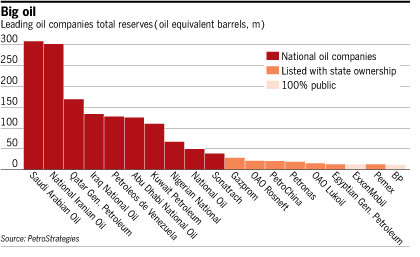Bigger Oil
Roger Pielke, Jr. (hat tip to a reader) points to an interesting FT Lex column that should offer some interesting insights to America's progressives:

"Big" and "oil" are mentioned so often in the same breath that it is easy to lose perspective. Motorists and environmentalists never tire of berating the dominant supermajors whose petrol stations and share listings make them the public face of the industry, their favourite target being America's ExxonMobil. If market value were the sole magnet for opprobrium then Exxon's executives could breathe a bit easier because PetroChina recently overtook it as the world's most valuable listed energy company.
But there is "Big Oil" "“ last year, Royal Dutch Shell earned more than $1bn a month "“ and then there is bigger oil. No oil major is able to affect energy prices on its own and even Exxon is far smaller than the world's largest energy company. It is not even close. Saudi Aramco's estimated hydrocarbon reserves of 300,000 million barrels of oil equivalent make it 15 times Exxon's size. Exxon comes in about 17th place, with the top 10 being entirely state-owned.
US oil company executives routinely get pulled in front of Congress to defend themselves against charges they are manipulating world oil prices. Huh? It would be as rational to accuse Grinnell College of manipulating national tuition rates. Americans can take comfort in the fact that by limiting their ability to seek new oil in the US, we have made sure that oil markets are not controlled by evil publicly traded companies like Exxon and Shell but instead are controlled by entirely more trustworthy entities like the governments of Iran, Saudi Ariabia, Venezuela, Russia, Nigeria, and China.
This chart also supports the one good argument I think there is for peak oil -- that most of the world's oil reserves are controlled by patently incompetent institutions (e.g. governments) that have very bad incentives that make them highly unlikely to invest well. The only reason these countries are able to produce at all is because western companies are stupid enough to keep walking into this cycle:
1. US companies invest huge amounts of capital and know-how to build oil industry
2. Once things are producing, local government steals it all (they call it "nationalization")
3. Oil fields go into extended decline due to short-term focused and incompetent government management
4. US companies invited back int to invest huge amounts of know-how and capital
5. repeat
Wiki has it that there are 1.7 trillion barrels in the Canadian oil sands (I think that's more than half the known reserves). Canada is now America's largest oil supplier. Hmm.
It takes a lot of $$$ to extract oil from oils sands.
I'm guessing about $50-80/bbl, depending on the quality of the source.
My personal theory is that as oil prices drop, tar sands production drops as the higher-cost production ceases, checking the price drop. As prices go up, they come back on line, checking the price increase. Until consumption increases/decreases to completely take tar sands out of the equation (i.e., practically all-on or all-off), oil will stay in its current narrow band.
anon
I think you are right about how the tar sands play out but the full cost (not incremental) of extracting actual oil out of the tar sands is probably higher than $50-80/bbl. That is why Shell announced this week that they are essentially giving up on the tar sands and are going to put their money elsewhere. If the full costs are more like $90-100/bbl then the tar sands will probably never be a significant contributor because the world economy probably cannot tolerate $100 oil.
Lumping all government oil companies together is misleading. The Saudi oil company is actually good at maintaining their equipment and production. The Venezuelian and Iranian oil companies are incompetent due to political ideology and interference.
While governments have a strong tendency to meddle in (and destroy) state owned companies, it is possible for this to be minimized.
The Saudi oil company is actually good at maintaining their equipment and production.
The Saudis don't maintain anything. It's all maintained by imported near-slave labor or foreign oil-field servicers.
Once things are producing, local government steals it all (they call it “nationalizationâ€)
If there's anything we should do with our military, preventing foreign governments from stealing from US people and companies should be high on the list.
Actually, when the state steals it is called, expropriation. In fact Mexico has a civic holiday to commemorate the theft of the oil refineries where the president gives a speech. Problem is now they need help and their constitution prohibits joint oil ventures, not that anyone would trust them.
http://en.wikipedia.org/wiki/Expropriation
http://en.wikipedia.org/wiki/Expropiaci%C3%B3n_petrolera
Poor link, but I have to leave for work.
http://www.encyclopedia.com/doc/1G1-167419195.html